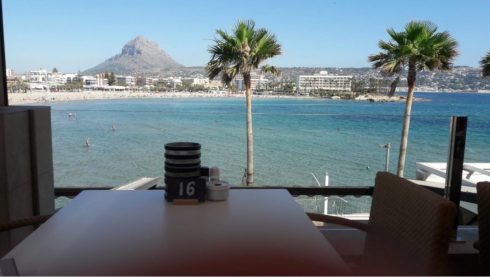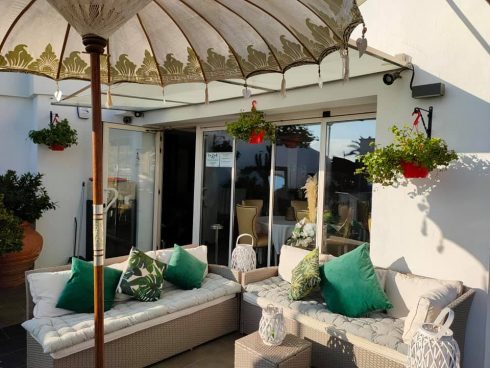JAVEA council has ordered the closure of four businesses, including a successful British-owned restaurant, in the Punta de Arenal area.
The authority won’t say why but the four premises have apparently fallen foul of Spain’s ‘Ley de Costas’ or Coastal Law.
In previous years there had been some complaints by residents over noise generated by some bars and restaurants in Punta de Arenal area during the summer.
Subsequent checks revealed that no laws were being broken.
One of the four businesses served with a closure notice, the British-owned Salt Restaurant, shut its doors this week and removed its fixtures and fittings.
-

-

Salt Restaurant, Javea.
Three other units in the Avenida de Ultramar block shared by Salt are still open.
The Olive Press understands they have filed legal submissions from lawyers that may have paused their closure.
Salt has been run by Jo Davenport for the last five years and despite the problems of the COVID pandemic, had pretty much regained most of its customers in recent months.
She recieved a notice to vacate the premises last month.
The Olive Press spoke to Davenport this week who is very upset about what had happened. “I’m totally distraught about this,” she said, adding:”I’m waiting for lawyers to tell me what we can do about it.”
Javea-based insurance company owner, Jennifer Cunningham, told the Olive Press that the news over Salt had come as a shock.
“Jo worked tirelessly to build up the restaurant which was very busy with wonderful food. She tied up everything she had into making it a great success and now its gone.”
“The Arenal has seen up-market businesses open with significant investment which has been good for the area.”
“It looked like a disaster zone years ago,” Cunningham added.

Questions are being raised as to why the council has taken the decision now to order the closure of restaurants which have stood there for years, with many viewing it as a blow against businesses who have struggled to survive the pandemic and restore tourism to the area.
The closures were raised at a plenary meeting of Javea council on Monday (October 4) by Compromis councillor, Juan Cardona, and Ciudadanos councillor, Enrique Escriva.
Both got little joy from the Partido Popular-run authority.
Activities councillor, Alberto Tur, refused to say what was behind the closure notices and their timing.
He stated that ‘files were still pending’ and that ‘it is a regulated process and that details would appear once everything had been done’.
Enrique Escriva pushed for more details but was told by Javea’s mayor, Jose Chulvi, to access all information ‘when the process is concluded’.

Prior to 1988 there were no laws governing coastal developments in Spain.
It meant a ‘free-for-all’ as homes and hospitality businesses popped up next to the sea with public access being blocked.
The 1988 Coastal Law introduced new zones for construction extending inland from the shore.
Despite the legislation, many municipalities across Spain turned a blind eye to the rules for decades.
It is down to each municipality to administer the law on behalf of the Coastal authority, which has its regional headquarters in Alicante.
There have been disputes and clashes in the Javea over the last 20 years concerning coastal laws.
Demolition orders and threats were issued by the Coastal authority against bars and restaurants in the Arenal area in 2010 and 2011.
One long-standing dispute involved the popular La Siesta beach bar that faced legal proceedings since it opened in 2001.
The chiringuito is owned by the Javea Company who have a number of outlets in the Arenal beach area,
As previously reported by the Olive Press, it was temporarily closed down by the Coastal authority in May 2020 following accusations that it expanded onto municipal land without permission.
French owner, Edgar Slama, fought hard against the decision and was eventually able to reopen but with a significantly smaller area to work with.
Javea is widely considered one of the most beautiful seaside towns on the Costa Blanca, retaining the traditional charms of a fishing port while growing to attract big-spending tourists during the busy summer season as well as northern Europeans escaping their own chilly climes during the winter months.
A recent report revealed that Javea was the location of the most expensive street in the entire Valencia region, where homes on the scenic Pic Tort cost an average of over €3million.
READ ALSO:

